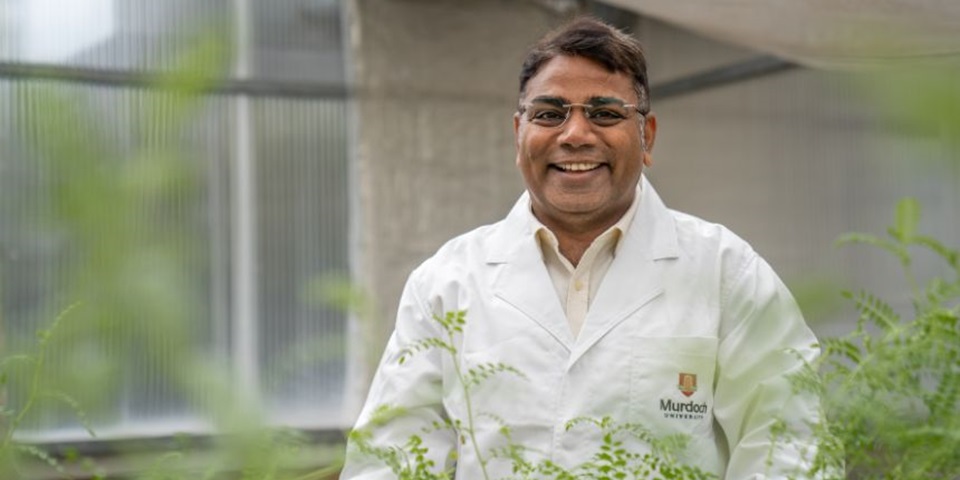News
Dream comes true for Murdoch University's first Royal Society Fellow

Agricultural scientist Professor Rajeev Varshney has been elected as a Fellow of the Royal Society, the first person from Murdoch University to do so in its near 50-year history.
An expert in crop genomics, genetics, molecular breeding and capacity building in developing countries, Professor Varshney is the third Australian to join the prestigious organisation from the field of Agricultural Sciences and Forestry, and one of just 13 worldwide. He is the fifth West Australian to be elected from any discipline.
Of the many accolades Professor Varshney has received in his 25-year career – he has won numerous international awards and more than 10 other academies and societies across the world - being elected to the Royal Society ranks highest.
Not least because of the historic institution’s status and role in some of the most significant discoveries in scientific history, but because he now joins the scientists that inspired him in the very beginnings of his academic journey.
“I am thrilled to be included with the stalwarts and giants of my field such as Norman Borlaug, MS Swaminathan, Jim Peacock, and Gurdev Khush, who have been inspiration and role models not only for me but all agricultural scientists across the world,” Professor Varshney said.
In fact, meeting Norman Borlaug – the father of the 'green revolution' and 1970 Nobel Prize winner for his lifetime’s work reducing world hunger – inspired a career pivot that led Professor Varshney to develop life-changing solutions for some of the world’s poorest farmers.
Today he is a Clarivate Analytics’ highly cited researcher and director of Murdoch’s Centre for Crop and Food Innovation as well as the State Agricultural Biotechnology Centre, and through both he leads the discovery, development, and delivery of innovative solutions to tackle problems facing global agriculture such as food security in the changing climate.
Murdoch University Vice Chancellor Professor Andrew Deeks congratulated Professor Varshney, saying his election was testament to a lifelong commitment to academic excellence.
“Professor Varshney embodies the philosophies Murdoch University was built on and continues to espouse today," he said.
"Throughout his research he has kept a keen focus sustainability that has impacted the lives of some of the world’s most vulnerable people.
“He is a very fitting recipient of this high honour and we are very proud to have him as Murdoch’s first Royal Society Fellow."
The Royal Society is the most prestigious and the oldest continuously existing scientific academy in the world, boasting 85 Nobel Laureates in its cohort and some of the world’s most well-known scientific thought leaders, including Sir David Attenborough.
Established in the United Kingdom in 1660, the Society’s fundamental purpose is to recognise, promote, and support excellence in science and to encourage the development and use of science for the benefit of humanity.
The Society has played a part in some of the most fundamental, significant, and life-changing discoveries in scientific history.
“I feel humbled and honoured to have been elected as a Fellow of the Royal Society, I never imagined that this could happen to me, it’s a dream come true for any scientist,” Professor Varshney said.
“I am grateful to my colleagues and collaborators from Australia, India, Germany, and many countries in Asia, Africa, America with whom I got an opportunity work during the last 25 years”.
Professor Varshney will travel to London in July to be formally admitted to the Society with other new Fellows at the Admissions Day ceremony, where they will sign the Charter Book and the Obligation of the Fellows of the Royal Society.
In becoming a Fellow, Professor Varshney joins the ranks of Stephen Hawking, Isaac Newton, Charles Darwin, Albert Einstein, Lise Meitner, Subrahmanyan Chandrasekhar and Dorothy Hodgkin.
These individuals have pushed forward the boundaries of their respective fields and had a beneficial influence on the world beyond . . . they are pioneering scientists and innovators from around the world who have confounded expectations and transformed our thinking. This year’s intake have already achieved incredible things, and I have no doubt that they will continue to do so.
- Sir Adrian Smith, President of the Royal Society
Read the Royal Society's media release.